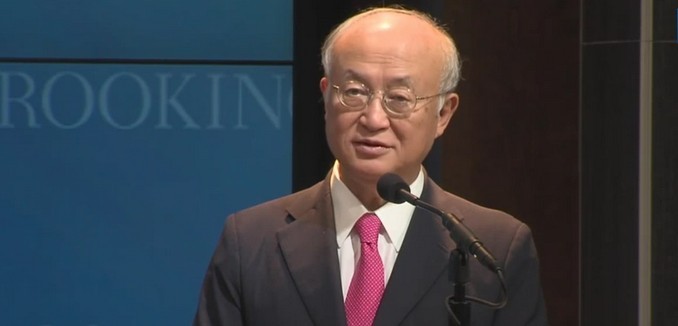It cannot be confirmed “that all nuclear material in Iran is in peaceful activities,” Yukiya Amano, the Director General of the International Atomic Energy Agency (IAEA), the nuclear watchdog of the United Nations, said in an address in Indonesia on Friday.
As far as Iran is concerned, the Agency is able to verify the non-diversion of nuclear material declared to us by Iran under its Safeguards Agreement.
But we are not in a position to provide credible assurance about the absence of undeclared nuclear material and activities in Iran, and therefore to conclude that all nuclear material in Iran is in peaceful activities.
2015 will be a significant year for the Iran nuclear issue. The future will depend very much on the outcome of the negotiations between the so-called E3+3 countries – China, France, Germany, Russia, Britain and the United States – and Iran.
In addressing the Iran nuclear issue, two things are important. First, with the cooperation of Iran, the Agency needs to clarify issues with possible military dimensions to the satisfaction of Member States. Also, Iran needs to implement the additional protocol so that the Agency can provide credible assurance about the absence of undeclared nuclear material and activities in Iran.
The Agency will continue to play an essential role in the future, including in verifying nuclear-related measures to be implemented by Iran if – as we all hope – a comprehensive agreement is reached between the E3+3 and Iran.
Amano’s concern about the possibility of undeclared Iranian nuclear activities echoes that of a number of experts, including former IAEA official Olli Heinonen, former American Director of Central Intelligence General Michael Hayden, and president of the Institute for Science and International Security David Albright.
Moreover, Amano pointed out that Iran has not come clean to the IAEA about its past nuclear activities, as the regime was required to do under the terms of the Joint Plan of Action that was signed with the P5+1 nations in November 2013.
The suspicion that Iran has a hidden nuclear program, coupled with its refusal to address all issues of its past nuclear research, make it impossible for the current round of negotiations to result in a verifiable agreement preventing Iran from developing a nuclear bomb.
In a speech yesterday, the Israeli Ambassador to the United States Ron Dermer defended Prime Minister Benjamin Netanyahu’s decision to speak before the U. S. Congress in March, observing that “[t]he agreement that is being discussed today is not an agreement that would dismantle Iran’s nuclear weapons capability, but rather one that could leave Iran as a nuclear threshold state.”
[Photo: Brookings Institution / YouTube ]




